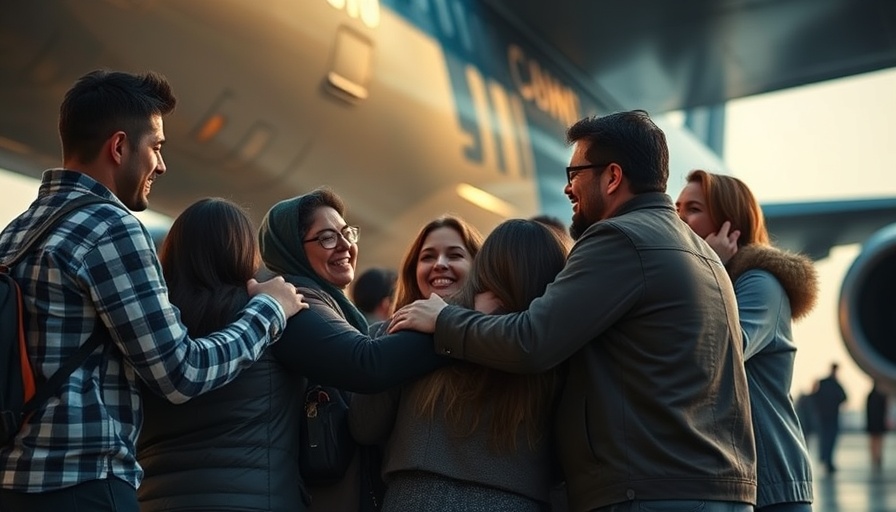
Venezuela's Diplomatic Maneuvers: A Look Inside the Recent Exchange
The release of 10 jailed U.S. citizens and permanent residents by Venezuela marks a significant diplomatic maneuver in a landscape complicated by political tensions and immigration policies. This swap, facilitated through an intricate arrangement involving El Salvador and the U.S., not only symbolizes a moment of relief for the freed Americans but also serves as a diplomatic victory for Venezuelan President Nicolás Maduro, U.S. President Donald Trump, and Salvadoran President Nayib Bukele.
Understanding the Complex Exchange
On July 18, 2025, a plane carrying the released Americans arrived at Joint Base San Antonio, where they were joyfully welcomed. The arrangement highlights the complexities of international diplomacy, particularly involving countries with contentious relations. Under this deal, Venezuela released these Americans in exchange for a group of Venezuelan migrants previously deported to El Salvador. By all accounts, this situation is a direct outcome of collaboration between the involved nations, demonstrating a unique diplomatic dance that resulted in mutual benefits for Maduro, Trump, and Bukele.
The Background of the Immigration Crisis
To understand the significance of this exchange, we must delve into the wider context of immigration policies initiated during Trump's administration. In March prior to the exchange, the Trump administration had executed a $6 million agreement with El Salvador to house Venezuelans in its notorious prison system. This policy, framed under the Alien Enemies Act, led to a legal contestation that reached the Supreme Court because many believed the administration lacked adequate evidence against the detained.
As the political landscape evolves, the recent swap reopens discussions regarding how immigration policies affect bilateral relations within Latin America. The deportation of Venezuelan migrants amid claims of gang affiliations further complicates the relationships between these nations, shedding light on their differing national interests and approaches toward international collaboration.
Venezuela's Messaging: A Day of Blessings
In a public statement, President Maduro described the day of the exchange as “a day of blessings and good news for Venezuela.” This proclamation underscores his intent to portray the exchange as a sign of Venezuela's re-emerging diplomatic capability, an image bolstered by the return of individuals he describes as wrongfully detained. The political implications of such messaging could extend beyond Venezuela, impacting its relationships and standing within the global community.
Reactions and Implications on Domestic Policy
The swap has elicited various reactions. While American officials commend the return of their citizens, skepticism exists regarding the sincerity of Maduro’s intentions. Having emerged from a harsh economic crisis, Venezuela’s leadership might leverage this event to gain favor domestically and internationally. The exchange can shift perceptions about Maduro’s regime, potentially easing sanctions or enhancing dialogues with other countries seeking diplomatic resolutions.
Insights for the Future: Beyond One Exchange
The diplomatic success of this exchange sets a precedent for future negotiations between the U.S., Venezuela, and bordering nations. It opens dialogues that address broader humanitarian issues affecting migrants' lives and their rights. What can be gleaned from this event is the potential for ongoing negotiations that may reshape how international relations function in Latin America going forward.
Understanding the Human Element
For the families of the released individuals, this moment of liberation transcends politics—it's a personal victory and a relief. The emotional reactions observed as the freed citizens reunited with their loved ones highlight the human cost associated with international politics. Beyond the headlines of diplomatic exchanges are the stories of individuals longing for freedom, safety, and a life without fear. Hence, the importance of compassion and understanding in policymaking can no longer be underestimated.
Conclusion: A Path Forward
The recent diplomatic triumph can be viewed as a catalyst for meaningful dialogue on immigration and human rights policies. The evolving landscape offers both challenges and opportunities for policymakers in the U.S., Venezuela, and El Salvador. Moving forward, transparency and open communication will be essential in crafting policies that reflect the aspirations of affected individuals while maintaining diplomacy across borders.
In light of these developments in international relations and the impact of immigration policies, it is recommended that individuals engage with local and national discussions about immigration reform. Understanding these global interconnected issues can empower citizens to advocate for policies that honor human dignity and promote peace.
 Add Row
Add Row  Add
Add 



Write A Comment